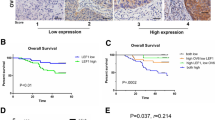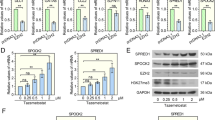Abstract
Background
Enhancer of zeste homolog 2 (EZH2), a stemness factor, plays roles in regulation of cell differentiation and embryonic development as well as cancer progression. Deregulation of EZH2 in cancers is correlated with tumor cell invasiveness, metastasis, and the patients’ poor outcome. However, the mechanistic role of EZH2 in cancer is ambiguous. In this study, we aimed to inhibit the expression of EZH2 in a cancer cell line, and evaluate consequence changes in gene expression pattern.
Materials and methods
Using specific retroviral shRNA-EZH2, EZH2 gene was silenced in the KYSE30 cell line. Relative comparative real-time PCR was used to confirm silencing of EZH2 and evaluate expression pattern of selected markers.
Results
Inhibition of EZH2 expression in KYSE30 cells caused significant changes in different genes. Indeed, HIWI and HEY1 genes were over- and underexpressed in KYSE30 cells, respectively, following EZH2 silencing. Other selected cancer stem cell markers were not changed significantly.
Conclusion
To the best our knowledge, there are variety of small molecule inhibitors to target EZH2 in cancer cells as a treatment candidate; therefore, our data in this study helps the researchers to select EZH2 for cancer therapy based on its mechanism and correlation with other markers.



Similar content being viewed by others
Abbreviations
- CSCs:
-
Cancer stem cells
- PRC2:
-
Polycomb repressive complex 2
- H3K27me3:
-
Trimethylation of histone H3 lysine 27
- TFs:
-
Transcription factors
- PIWIL1:
-
Piwi-like protein 1
- NICD:
-
Notch intracellular domain
References
Melling N, Thomsen E, Tsourlakis MC, Kluth M, Hube-Magg C, Minner S, et al. Overexpression of enhancer of zeste homolog 2 (EZH2) characterizes an aggressivesubset of prostate cancers and predicts patient prognosis independently from pre-and postoperatively assessed clinicopathological parameters. Carcinogenesis. 2015;36(11):1333–40. doi:10.1093/carcin/bgv137.
Liu Y, Liu T, Bao X, He M, Li L, Yang X. Increased EZH2 expression is associated with proliferation and progression of cervical cancer and indicates a poor prognosis. Int J Gynecol Pathol. 2014;33(3):218–24.
Ahani N, Shirkoohi R, Rokouei M, Eskandani MA, Nikravesh A. Overexpression of enhancer of zeste human homolog 2 (EZH2) gene in human cytomegalovirus positive glioblastoma multiforme tissues. Med Oncol. 2014;31(11):1–5.
Song-Bing H, Hao Z, Jian Z, Guo-Qiang Z, Tuo H, Dai-Wei W, et al. Inhibition of EZH2 expression is associated with the proliferation, apoptosis and migration of SW620 colorectal cancer cells in vitro. Exp. Biol. Med. 2014. doi:10.1177/1535370214542215.
Liu F, Gu L, Cao Y, Fan X, Zhang F, Sang M. Aberrant overexpression of EZH2 and H3K27me3 serves as poor prognostic biomarker for esophageal squamous cell carcinoma patients. Biomarkers. 2016;21(1):80–90. doi:10.3109/1354750X.2015.1118537.
Kondo Y. Targeting histone methyltransferase EZH2 as cancer treatment. J Biochem. 2014;156(5):249–57. doi:10.1093/jb/mvu054.
Chou R-H, Yu Y-L, Hung M-C. The roles of EZH2 in cell lineage commitment. Am J Transl Res. 2011;3(3):243.
Cox DN, Chao A, Baker J, Chang L, Qiao D, Lin H. A novel class of evolutionarily conserved genes defined by piwi are essential for stem cell self-renewal. Genes Dev. 1998;12(23):3715–27.
Raeisossadati R, Abbaszadegan MR, Moghbeli M, Tavassoli A, Kihara AH, Forghanifard MM. Aberrant expression of DPPA2 and HIWI genes in colorectal cancer and their impacts on poor prognosis. Tumor Biol. 2014;35(6):5299–305.
Wang Y, Jiang Y, Bian C, Dong Y, Ma C, Hu X, et al. Overexpression of Hiwi inhibits the cell growth of chronic myeloid leukemia K562 cells and enhances their chemosensitivity to daunomycin. Cell Biochem Biophys. 2015;73(1):129–35. doi:10.1007/s12013-015-0668-7.
Xie Y, Yang Y, Ji D, Zhang D, Yao X, Zhang X. Hiwi downregulation, mediated by shRNA, reduces the proliferation and migration of human hepatocellular carcinoma cells. Mol Med Rep. 2015;11(2):1455–61.
Wang D-W, Wang Z-H, Wang L-L, Song Y, Zhang G-Z. Overexpression of hiwi promotes growth of human breast cancer cells. Asian Pac J cancer Prev APJCP. 2013;15(18):7553–8.
Li S, Meng L, Zhu C, Wu L, Bai X, Wei J, et al. The universal overexpression of a cancer testis antigen hiwi is associated with cancer angiogenesis. Oncol Rep. 2010;23(4):1063–8.
Yang L, Bi L, Liu Q, Zhao M, Cao B, Li D, et al. Hiwi promotes the proliferation of colorectal cancer cells via upregulating global DNA methylation. Dis Markers. 2015;2015:383056. doi:10.1155/2015/383056.
Takebe N, Miele L, Harris PJ, Jeong W, Bando H, Kahn M, et al. Targeting Notch, Hedgehog, and Wnt pathways in cancer stem cells: clinical update. Nat Rev Clin Oncol. 2015;12(8):445–64. doi:10.1038/nrclinonc.2015.61.
Deng G, Ma L, Meng Q, Ju X, Jiang K, Jiang P, et al. (2015) Notch signaling in the prostate: critical roles during development and in the hallmarks of prostate cancer biology. J Cancer Res Clin Oncol. 2016;142(3):531-47. doi:10.1007/s00432-015-1946-x.
Forghanifard MM, Taleb S, Abbaszadegan MR. Notch signaling target genes are directly correlated to esophageal squamous cell carcinoma tumorigenesis. Pathol Oncol Res. 2015;21(2):463–7.
Barde I, Salmon P, Trono D (2010) Production and titration of lentiviral vectors. Curr Protoc Cell Biol. 2011;26:Unit 26.8. doi:10.1002/0471143030.cb2608s50.
Wassef M, Rodilla V, Teissandier A, Zeitouni B, Gruel N, Sadacca B, et al. Impaired PRC2 activity promotes transcriptional instability and favors breast tumorigenesis. Genes Dev. 2015;29(24):2547–62. doi:10.1101/gad.269522.115.
Islam F, Gopalan V, Wahab R, Smith RA, Lam AK-Y. Cancer stem cells in oesophageal squamous cell carcinoma: identification, prognostic and treatment perspectives. Crit Rev Oncol Hematol. 2015;96(1):9–19. doi:10.1016/j.critrevonc.2015.04.007.
Zhao RC, Zhu Y-S, Shi Y. New hope for cancer treatment: exploring the distinction between normal adult stem cells and cancer stem cells. Pharmacol Ther. 2008;119(1):74–82.
Rad A, Farshchian M, Forghanifard MM, Matin MM, Bahrami AR, Geerts D, et al. Predicting the molecular role of MEIS1 in esophageal squamous cell carcinoma. Tumor Biol. 2016;37(2):1715–25.
Yamaguchi H, Hung M-C. Regulation and role of EZH2 in cancer. Cancer Res Treat Off J Korean Cancer Assoc. 2014;46(3):209.
Liu X, Sun Y, Guo J, Ma H, Li J, Dong B, et al. Expression of hiwi gene in human gastric cancer was associated with proliferation of cancer cells. Int J Cancer. 2006;118(8):1922–9.
Liang D, Yang Y, Liu Y (2013) The role Hiwi gene in the maintenance of lung cancer stem cell populations. Neoplasma. 2013. doi:10.4149/neo_2014_022.
Liu W, Gao Q, Chen K, Xue X, Li M, Chen Q, et al. Hiwi facilitates chemoresistance as a cancer stem cell marker in cervical cancer. Oncol Rep. 2014;32(5):1853–60.
Liekens AM, De Knijf J, Daelemans W, Goethals B, De Rijk P, Del-Favero J. BioGraph: unsupervised biomedical knowledge discovery via automated hypothesis generation. Genome Biol. 2011;12(6):R57.
Taleb S, Abbaszadegan MR, Moghbeli M, Roudbari NH, Forghanifard MM. HES1 as an independent prognostic marker in esophageal squamous cell carcinoma. J Gastrointest Cancer. 2014;45(4):466–71.
Acknowledgements
The authors gratefully acknowledge colleagues at the Human Genetics Division of Avicenna Research Institute for their helps and technical supports.
Author information
Authors and Affiliations
Corresponding author
Ethics declarations
Conflict of Interest
The authors declare that they have no conflict of interest.
Rights and permissions
About this article
Cite this article
Karami Madani, G., Rad, A., Molavi, M. et al. Predicting the Correlation of EZH2 and Cancer Stem Cell Markers in Esophageal Squamous Cell Carcinoma. J Gastrointest Canc 49, 437–441 (2018). https://doi.org/10.1007/s12029-017-9985-y
Published:
Issue Date:
DOI: https://doi.org/10.1007/s12029-017-9985-y




